Bad Cholesterol: A Myth and a Fraud!
Conventional medical wisdom about cholesterol and the role
of statins is now being challenged by a growing number
of health professionals. Researchers at the University San Diego School of Medicine
UCSD point out that high cholesterol is protective, rather than harmful and that low
cholesterol is a risk factor for heart arrhythmias (leading cause of death if heart
attack occurs). USA Today reported that Statins have killed and injured more people than the government has acknowledged.
The Masai people of Kenya only eat only milk,
blood and meat. According to the cholesterol theory they should have dangerously
high blood levels of the lipid. But this is not the case! Dr. Ravnskov
M.D reports that the Masai blood cholesterol levels are among the lowest
in the world. For decades now we have been told not to eat saturated fats.
Years ago the media ran the all too familiar line about the dangers of
eggs. This message has been rescinded at least. But we have got a long
way to go before we can return to sense. The media has played a huge part
in the perpetuation of this dangerous myth. It is tied to revenue received
from pharmaceutical companies and the food industry.
Engineered vegetable oils
have been ushered into the daily diets in place of the
demonized butter. The fat free leg of lamb has no resemblance to the wholesome
meal of our youth; our palates and hunger are no longer satiated.
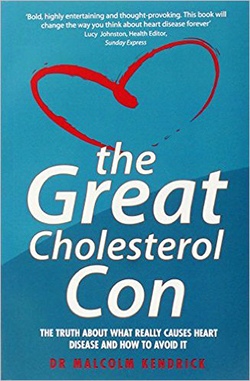 Uffe Ravnskov, MD, PhD -
"People with high cholesterol live the longest.
This statement seems so incredible that it takes a long time to clear one's
brainwashed mind to fully understand its importance. Yet the fact that
people with high cholesterol live the longest emerges clearly from many
scientific papers. Consider the finding of Dr. Harlan Krumholz of the Department
of Cardiovascular Medicine at Yale University, who reported in 1994 that
old people with low cholesterol died twice as often from a heart attack
as did old people with a high cholesterol. Supporters of the cholesterol
campaign consistently ignore his observation, or consider it as a rare
exception, produced by chance among a huge number of studies finding the
opposite."
Uffe Ravnskov, MD, PhD -
"People with high cholesterol live the longest.
This statement seems so incredible that it takes a long time to clear one's
brainwashed mind to fully understand its importance. Yet the fact that
people with high cholesterol live the longest emerges clearly from many
scientific papers. Consider the finding of Dr. Harlan Krumholz of the Department
of Cardiovascular Medicine at Yale University, who reported in 1994 that
old people with low cholesterol died twice as often from a heart attack
as did old people with a high cholesterol. Supporters of the cholesterol
campaign consistently ignore his observation, or consider it as a rare
exception, produced by chance among a huge number of studies finding the
opposite."
The European Heart Journal has published the results of a 3-year study
involving 11,500 patients. Researcher Behar and associates found that in
the low cholesterol group (total cholesterol below 160 mg/dl) the relative
risk of death was 2.27 times higher relative to those with high cholesterol.
The most common cause of death in the low cholesterol group was cancer
while the risk of cardiac death was the same in both groups.
Evidence that statin treatment causes cancer. "Carcinogenicity of lipid-lowering drugs"
by Thomas Newman in the January 3rd, 1996 issue of the Journal of the American
Medical Association tabulated rodent data on the cancer causing effects
of cholesterol-lowering medications from the 1994 Physician's Desk Reference,
and other sources (275:55).
Researchers at Gutenberg University in Mainz, Germany, showed for the
first time that low level of glutathione
suggest a coming heart attack. The New England Journal of Medicine recently
published a study saying that the higher your glutathione levels, the less
likely you are to have a heart attack or heart disease. It appears that
high glutathione levels are protective against cardiovascular disease.
The American Heart Association journal Stroke has also reported research
saying that "higher levels of plasma glutathione
(GSH) are associated with a lower incidence of cardiovascular disease,"
particularly cerebral small vessel disease.
Robert O. Young D.Sc., Ph.D. - "Cholesterol does NOT
cause heart attacks or stokes. Not a single one. This is a distortion and an inaccuracy based on
faulty observation and inquiry. Environmental, dietary and metabolic acid cause heart attacks and strokes.
The body releases cholesterol or LDL's to buffer or chelate the toxic lethal affects of
acid to protect the body, not harm the body."

High Cholesterol Protects Against Infection
Many studies have found that low cholesterol is in certain respects worse than high cholesterol. For instance,
in 19 large studies of more than 68,000 deaths, reviewed by Professor David R. Jacobs and his
co-workers from the Division of Epidemiology at the University of Minnesota, low cholesterol
predicted an increased risk of dying from gastrointestinal and respiratory diseases.
 Most gastrointestinal and respiratory diseases have an infectious origin.
Therefore, a relevant question is whether it is the infection that lowers
cholesterol or the low cholesterol that predisposes to infection? To answer
this question Professor Jacobs and his group, together with Dr. Carlos
Iribarren, followed more than 100,000 healthy individuals in the San Francisco
area for fifteen years. At the end of the study those who had low cholesterol
at the start of the study had more often been admitted to the hospital
because of an infectious disease. This finding cannot be explained away
with the argument that the infection had caused cholesterol to go down,
because how could low cholesterol, recorded when these people were without
any evidence of infection, be caused by a disease they had not yet encountered?
Isn´t it more likely that low cholesterol in some way made them more
vulnerable to infection, or that high cholesterol protected those who did
not become infected? Much evidence exists to support that interpretation.
Most gastrointestinal and respiratory diseases have an infectious origin.
Therefore, a relevant question is whether it is the infection that lowers
cholesterol or the low cholesterol that predisposes to infection? To answer
this question Professor Jacobs and his group, together with Dr. Carlos
Iribarren, followed more than 100,000 healthy individuals in the San Francisco
area for fifteen years. At the end of the study those who had low cholesterol
at the start of the study had more often been admitted to the hospital
because of an infectious disease. This finding cannot be explained away
with the argument that the infection had caused cholesterol to go down,
because how could low cholesterol, recorded when these people were without
any evidence of infection, be caused by a disease they had not yet encountered?
Isn´t it more likely that low cholesterol in some way made them more
vulnerable to infection, or that high cholesterol protected those who did
not become infected? Much evidence exists to support that interpretation.

New cholesterol guidelines for converting healthy people into patients
Uffe Ravnskov, MD, PhD
People with high cholesterol live the longest. This statement seems so incredible
that it takes a long time to clear one´s brainwashed mind to fully
understand its importance. Yet the fact that people with high cholesterol
live the longest emerges clearly from many scientific papers. Consider
the finding of Dr. Harlan Krumholz of the Department of Cardiovascular
Medicine at Yale University, who reported in 1994 that old people with
low cholesterol died twice as often from a heart attack as did old people
with a high cholesterol. Supporters of the cholesterol campaign consistently
ignore his observation, or consider it as a rare exception, produced by
chance among a huge number of studies finding the opposite.
Instead of preventing cardiovascular disease the new guidelines may
increase the mortality of other diseases, transform healthy individuals
into unhappy hypochondriacs obsessed with the chemical composition of their
food and their blood, reduce the income of producers of animal fat, undermine
the art of cuisine, destroy the joy of eating, and divert health
care money from the sick and the poor to the rich and the healthy. The
only winners are the drug and imitation food industry and the researchers
that they support.
THE CHOLESTEROL MYTH:
Dr. Barry Groves, Ph.D.>Over the past couple of decades there has been a growing concern about
fats and cholesterol. Dietitians, nutritionists and doctors have been telling
us that fat is a killer. Apart from those with a very rare disease, has
cholesterol got anything to do with heart disease - or any other disease?
And even if it has, will a change of diet be beneficial? Like all
debates, this one about cholesterol has two sides. The Cholesterol Myth
explores the evidence on which present healthy eating' dietary recommendations
are based.
Heart Frauds: Uncovering the Biggest Health Scam in History
 Because of the propaganda, you can be forgiven for thinking that cholesterol
is a harmful alien substance that should be avoided at all costs. In fact,
nothing could be further from the truth. Cholesterol is an essential component
in the body. It is found in all the cells of the body, particularly in
the brain and nerve cells. Body cells are continually dying and new ones
being made. Cholesterol is a major building block from which cell walls
are made. Cholesterol is also used to make a number of other important
substances: hormones (including the sex hormones), bile acids and, in conjunction
with sunlight on the skin, vitamin D 3 . The body uses large quantities
of cholesterol every day and the substance is so important that, with the
exception of brain cells, every body cell has the ability to make it.
Because of the propaganda, you can be forgiven for thinking that cholesterol
is a harmful alien substance that should be avoided at all costs. In fact,
nothing could be further from the truth. Cholesterol is an essential component
in the body. It is found in all the cells of the body, particularly in
the brain and nerve cells. Body cells are continually dying and new ones
being made. Cholesterol is a major building block from which cell walls
are made. Cholesterol is also used to make a number of other important
substances: hormones (including the sex hormones), bile acids and, in conjunction
with sunlight on the skin, vitamin D 3 . The body uses large quantities
of cholesterol every day and the substance is so important that, with the
exception of brain cells, every body cell has the ability to make it.
Cholesterol may be ingested in animal products, but less than twenty
percent of your body's cholesterol needs will be supplied in this way.
Your body then makes up the difference. If you eat less cholesterol, your
body merely compensates by making more. Although the media and food companies
still warn against cholesterol in diet, it has been repeatedly demonstrated
that the level of cholesterol in your blood is affected very little by
the amount of cholesterol you eat.

Vital roles of cholesterol in the body
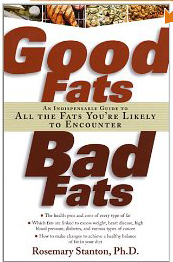 F. Batmanghelidj, M.D. - "We in the medical profession, totally oblivious
of the vital roles of cholesterol in the body, have been duped into thinking
that it is this substance that causes arterial disease of the heart and
the brain. The pharmaceutical industry has capitalized on the slogan of
bad cholesterol and has produced toxic-to-the-body chemicals that minimally
lower the level of cholesterol in the body and in the process cause liver
damage to thousands of people, some who die as a result of using the medication."
F. Batmanghelidj, M.D. - "We in the medical profession, totally oblivious
of the vital roles of cholesterol in the body, have been duped into thinking
that it is this substance that causes arterial disease of the heart and
the brain. The pharmaceutical industry has capitalized on the slogan of
bad cholesterol and has produced toxic-to-the-body chemicals that minimally
lower the level of cholesterol in the body and in the process cause liver
damage to thousands of people, some who die as a result of using the medication."
Uffe Ravnskov, MD, PhD - "The idea that too much animal fat and
a high cholesterol is dangerous to your heart and vessels is nothing but a myth."
"To produce healthy hormones in your body you need cholesterol. Listening
to the foolishness of keeping your cholesterol low by always eating low
fat, low cholesterol foods all the time, will lead to premature aging,
more depression, more overweight problems, more anxiety, more cancer, more
heart disease, etc. Then the pharmaceuticals will sell you synthetic estrogen,
DHEA, testosterone, cholesterol lowering drugs, Prozac, Xanax, Valium,
etc. ALL OF WHICH encourage disease in your body. Then they will sell you
chemo and radiation. And then they will say 'we have nothing else to offer
you.' The question is, did they ever?"Timothy Long
Legacy of statin drug use at today's high doses
The unacceptable legacy of statin drug use at today's high doses is a trail
of chronic aches and pains, numbness, weakness, confusion, fatigue, shortness
of breath and even heart failure in hordes of unsuspecting victims. Many
physicians now have become victims of statin drug use and, like the author,
now suspect the message of persuasive drug "reps" may not have been the
entire truth. This book will frighten you as it informs you. The reader
will never be quite the same again.
Dr. Duane Graveline, former astronaut, aerospace medical research scientist,
flight surgeon, and family doctor, given Lipitor to lower his cholesterol,
loses his short-term memory for several hours. He discontinues the drug,
but a year later at his annual NASA physical is urged to resume it at half
the dose. Six weeks later he loses both short and retrograde memories for
half a day and is diagnosed in the ER with transient global amnesia (TGA).
Appalled by the medical community's ignorance of the cognitive side effects
of the statin drugs, he begins searching for answers to his traumatic experience.
Lipitor(r), Thief of Memory, Statin Drugs and the Misguided War On Cholesterol
is the "scary, appealingly written" account of his findings.
Class action lawsuit filed against Pfizer the makers of Lipitor
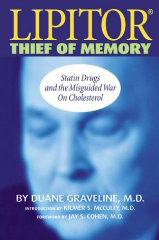 A class action suit filed against Pfizer, Inc. the makers of
Lipitor ( atorvastatin calcium ) contends that the manufacturers of this
statin drug promoted its use to a population that would receive little
or no cardiovascular benefit. The groups specifically mentioned in the
lawsuit are women and the elderly who in various clinical trials have reportedly
been shown to have received no clinical benefit by taking Lipitor. The
plaintiffs contend that unnecessary drug costs were incurred as a result
by patients in these groups and their health care providers.
A class action suit filed against Pfizer, Inc. the makers of
Lipitor ( atorvastatin calcium ) contends that the manufacturers of this
statin drug promoted its use to a population that would receive little
or no cardiovascular benefit. The groups specifically mentioned in the
lawsuit are women and the elderly who in various clinical trials have reportedly
been shown to have received no clinical benefit by taking Lipitor. The
plaintiffs contend that unnecessary drug costs were incurred as a result
by patients in these groups and their health care providers.
"I've long wondered why everyone over the age of 40 seems to be on Lipitor.
Lipitor is in fact the Number 1 selling drug in the world. TRANS
FATS by Judith Shaw has answered that question. Our government is in
bed with the food and pharmaceutical industries. It allows the food industry
to profit by poisoning our food with partially hydrogenated oils - even
though the human body's tolerance level is zero. And, it allows the pharmaceutical
industry to profit enormously from the sale of cholesterol-lowering drugs
prescribed for people suffering from a lifetime of toxic trans
fat build-up. Sincere thanks to Judith Shaw for bringing this to our attention
in such a concise, readable way. Insincere thanks to our US Government
for betraying its citizens once again. As Ronald Reagan said, "Government
is not the solution to our problems; Government IS the problem." We need
to begin holding our elected scoundrels accountable for their duplicity!"

The Margarine Hoax
Sally Fallon and Mary G. Enig, PhD - "It's no longer a secret
that the margarine Americans have been spreading on their toast, and the
hydrogenated fats they eat in commercial baked goods like cookies and crackers,
is the chief culprit in our current plague of cancer and heart disease.
But mainline nutrition writers continue to denigrate butter—recommending
new fangled tub spreads instead. These may not contain hydrogenated fats
but they are composed of highly processed rancid vegetable oils, soy protein
isolate and a host of additives. A glitzy cookbook called Butter Busters
promotes butter buds, made from maltodextrin, a carbohydrate derived from
corn, along with dozens of other highly processed so-called low-fat commercial products."
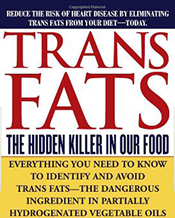 Margarine is made by adding hydrogen atoms to the fat molecules to make
them more saturated, raising the melting point of the fat so it remains
a solid at room temperature, i.e., the margarine won't run all over the
table. This process, called "hydrogenation," requires the presence of a
metal catalyst and temperatures of about 500°F (260°C) for the
reaction to take place. It causes about half of the cis- bonds to flip
over into a trans- configuration. Another 'side-effect' of hydrogenation
is that a residue of toxic metals, usually nickel and aluminum, is left
behind in the finished product." Since trans- fats don't occur in nature,
our bodies don't know how to deal with them effectively and they act as poisons to crucialcellular
reactions. The body tries to use them as it would the cis- form, and they
wind up in cell membranes and other places they shouldn't be." Scientific
evidence continues to mount that trans- fats contribute to heart disease
and possibly other conditions as well. Even the conservative Harvard Health
Letter referred to them as "the new enemy."
Margarine is made by adding hydrogen atoms to the fat molecules to make
them more saturated, raising the melting point of the fat so it remains
a solid at room temperature, i.e., the margarine won't run all over the
table. This process, called "hydrogenation," requires the presence of a
metal catalyst and temperatures of about 500°F (260°C) for the
reaction to take place. It causes about half of the cis- bonds to flip
over into a trans- configuration. Another 'side-effect' of hydrogenation
is that a residue of toxic metals, usually nickel and aluminum, is left
behind in the finished product." Since trans- fats don't occur in nature,
our bodies don't know how to deal with them effectively and they act as poisons to crucialcellular
reactions. The body tries to use them as it would the cis- form, and they
wind up in cell membranes and other places they shouldn't be." Scientific
evidence continues to mount that trans- fats contribute to heart disease
and possibly other conditions as well. Even the conservative Harvard Health
Letter referred to them as "the new enemy."
Engineered Fats and Oils and The Degenerative Disease Epidemic
Most cholesterol is manufactured within the body. A maximum of about
4% of all cholesterol comes from the diet. Cholesterol is the raw material
for the adrenal stress hormones and the sex hormones. The body often reacts
to stress by producing more cholesterol. This allows the body to make more
stress-fighting hormones. As biochemical stress is reduced through a scientific
nutrition program, cholesterol levels often decrease without the need for
restrictive diets.
In fact, eating some animal products often helps balance body chemistry.
In these instances, cholesterol levels or the cholesterol/HDL ratio improves
although the diet contains cholesterol-containing foods. In general, fast
oxidizers or fast metabolizers can eat more butter and other fatty foods.
True fast oxidizers run lower cholesterol levels. They also burn up fats
more rapidly and efficiently. Slow oxidizers should restrict all fats and
oils, including butter. However, a small amount of butter (1 teaspoon daily)
may be eaten by slow oxidizers. Butter is a healthy fat.
Your body needs fat to function properly. Besides being an energy source, fat is a nutrient
used in the production of cell membranes, as well as
in several hormone-like compounds called eicosanoids. These compounds help
regulate blood pressure, heart rate, blood vessel constriction, blood clotting
and the nervous system. In addition, dietary fat carries fat-soluble vitamins
A, D, E and K from your food into your body. Fat also helps
maintain healthy hair and skin, protects vital organs, keeps your body
insulated, and provides a sense of fullness after meals (satiety).

Taking the Fear out of Eating Fats
Don't be afraid to eat real food. The closer
to nature, the better it is for you. Choose foods in their whole state.
Do your best to avoid processed, prepackaged foods, especially those that
are reduced-fat products.
2. REPLACE MARGARINE WITH BUTTER
We have been told to eat margarine because butter raises our cholesterol
and is bad for our heart. The truth is that margarine eaters have twice
the rate of heart disease as butter eaters (Nutrition Week 3/22/91 21:12).
We've also been told that saturated fats, the kind that are in butter,
clog the arteries. But according to a study published in The Lancet (1994
344:1195), the fatty acids found in artery clogs are mostly unsaturated,
not saturated, as we have been led to believe.
Butter is a natural fat, made from cream. Margarine is an artificial
concoction of chemicals. Not only does butter taste better, but it's good
for you. Butter is a source of fat-soluble vitamins A, D, E and K, and
important trace minerals magnesium, zinc, chromium, selenium and iodine.
Purchase organic butter produced without the use of hormones, steroids
and antibiotics. Raw butter from pasture-fed cows is even better.
3. REPLACE PROCESSED VEGETABLE OILS WITH TRADITIONAL FATS
For many years the media have told us to replace saturated fats with
unsaturated fats, like those from vegetable oils. This advice does more
harm than good. In the process of producing vegetable oils, toxic chemicals
and high temperatures are used to extract the oil from the seed or bean.
In this process virtually all of the nutritional value has been destroyed,
not to mention that the high temperatures turn the oil rancid before you
even bring it home.
Even worse, most of the vegetable oils that end up in packaged foods
have been partially hydrogenated, a process that rearranges the fatty acid
molecules, turning them from the natural configuration into trans fats,
most of which do not exist in nature. Not only are trans fats difficult
to digest, they have been implicated as a cause of both cancer and heart
disease.
According to Dr. John Lee, MD, of California, "Trans fatty acids enter
our metabolic processes but are defective for our bodily uses. Our cell
membranes, our hormone synthesis, our immune system, our ability to deal
with inflammation and to heal, and many, many, other vital systems all
become defective when trans fatty acids substitute for the health-giving
cis fatty acids. Unknowingly we are poisoning ourselves."
The best fats for us to eat are those that generations thrived on before
Quaker and Nabisco became household names. These traditional fats include
butter, lard, tallow, olive oil, coconut and palm oils—fats that you don't
hear about too often on TV!
BUTTER
Butter is a rich source of fat-soluble vitamins A, D, E, and K. The
saturated fat in butter actually enhances our immune function, protects
the liver from toxins, provides nourishment for the heart in times of stress,
gives stiffness and integrity to our cell membranes, and aids in the proper
utilization of omega-3 essential fatty acids. Butter will add extra nutrients
and flavor to your vegetables, whole grain breads, and sautéed dishes.
more
LARD
Lard is a traditional fat, the mention of which causes us moderns to
cringe. Yet lard is a healthy, natural fat. Lard is rendered fat from pork
and is mostly monounsaturated. Lard can be a wonderful source of vitamin
D. Traditionally, lard has been used and enjoyed for pastries and frying
potatoes—until the vegetable oil industry took over. Don't be afraid to
experiment with lard in your kitchen, it will add lots of flavor to your
food.
On a side note, I worked with a client from Mexico who was here visiting
her daughter over the summer. The mother was 85 years old, very strong
and healthy, and had not one wrinkle on her beautiful face. Her skin was
incredible! It was so soft and silky, not at all dry, scaly or wrinkly
like the skin I'm so used to seeing with most of my clients. I just had
to ask her what kind of fats she eats. Her daughter translated my question
to her mother and then replied, "She said she eats mostly lard. I can't
believe it! I keep telling her that's not good for her, but she just won't
listen!" Us silly Americans!

Why Butter is Better
Butter contains lecithin, a substance that assists in the proper assimilation
and metabolism of cholesterol and other fat constituents. Butter also contains
a number of anti-oxidants that protect against the kind of free radical
damage that weakens the arteries. Vitamin A and vitamin E found in butter
both play a strong anti-oxidant role. Butter is a very rich source of selenium,
a vital anti-oxidant, containing more per gram than herring or wheat germ.
Butter is also a good dietary source cholesterol. What?? Cholesterol
an anti-oxidant?? Yes indeed, cholesterol is a potent anti-oxidant that
is flooded into the blood when we take in too many harmful free-radicals, usually
from damaged and rancid fats in margarine and highly processed vegetable
oils. A Medical Research Council survey showed that men eating butter
ran half the risk of developing heart disease as those using margarine.
Butterfat contains glycospingolipids, a special category of fatty acids
that protect against gastro-intestinal infection, especially in the very
young and the elderly. For this reason, children who drink skim milk have
diarrhea at rates three to five times greater than children who drink whole
milk. Cholesterol in butterfat promotes health of the intestinal wall
and protects against cancer of the colon. Short and medium chain fatty
acids protect against pathogens and have strong anti-fungal effects.
Butter thus has an important role to play in the
treatment of Candida overgrowth.
Who benefits from the propaganda blitz against butter? The list is a
long one and includes orthodox medicine, hospitals, the drug companies
and food processors. But the chief beneficiary is the large corporate farm
and the cartels that buy their products, chiefly cotton, corn and soy, America's
three main crops, which are usually grown as monocultures on large farms,
requiring extensive use of artificial fertilizers and pesticides. All three soy,
cotton and corn, can be used to make both margarine and the new designer
spreads. In order to make these products acceptable to the up-scale consumer,
food processors and agribusiness see to it that they are promoted as health
foods. We are fools to believe them.
Margarine killed turkeys
Margarine was originally manufactured to fatten turkeys. When it killed
the turkeys, the people who had put all the money into the research wanted
a payback so they put their heads together to figure out what to do with
this product to get their money back. It was a white substance with no
food appeal so they added the yellow coloring and sold it to people to
use in place of butter. How do you like it? They have come out with some
clever new flavorings.
The difference between margarine and butter:
- Both have the same amount of calories.
- Butter is slightly higher in saturated fats at 8 grams compared to 5 grams.
- Eating margarine can increase heart disease in women by 53% over eating the same amount of butter,
according to a recent Harvard Medical Study
- Eating butter increases the absorption of many other nutrients in other foods.
- Butter has many nutritional benefits where margarine has a few only because they are added!
- Butter tastes much better than margarine and it can enhance the flavors of other foods.
- Butter has been around for centuries where margarine has been around for less than 100 years .
- And now, for Margarine...
- Very high in Trans fatty acids.
- Triple risk of coronary heart disease .
- Increases total cholesterol and LDL (this is the bad cholesterol) and lowers HDL cholesterol (the good cholesterol).
- Increases the risk of cancers up to five fold.
- Lowers quality of breast milk.
- Decreases immune response.
- Decreases insulin response.
- Margarine is but ONE MOLECULE away from being PLASTIC. This fact alone
was enough to have me avoiding margarine for life and anything else that
is hydrogenated (this means hydrogen is added, changing the molecular structure
of the substance). You can try this yourself: Purchase a tub
of margarine and leave it in your garage or shaded area. Within a couple
of days you will note a couple of things: no flies, not even those pesky
fruit flies will go near it (that should tell you something)
and it does not rot or smell differently because it has no nutritional
value; nothing will grow on it. Even those teeny weenie microorganisms
will not find a home to grow. Why? Because it is nearly
plastic . Would you melt your Tupperware and spread that on your toast?

Immunocal and high cholesterol, high triglycerides, high blood sugar
"My friend Dan started "feeding me about 4 or so months
ago when we got our first shipment of Immunocal. I figured it was
harmless and we had so much of it, that I might as well try it. About two
month after I started taking Immunocal, I noticed my energy levels were
way up. Seriously up. I joined a workout class. I mean,
I'm a total couch potato and never in my life did I imagine ever doing
such a thing. It's just never sounded fun before. About a month
after that, I joined a running club. I'm working out 5-6 days a week
now. I went from total sloth to exercise freak in just 3 months.
But wait, it gets better. I've been on medication for high cholesterol,
high triglycerides, high blood sugar, dermatitis and ADHD for years.
About two weeks ago I started having weird side effects. My doctor
suspected it was my cholesterol medication and recommended that I stop
taking it to see if the side effects went away. I decided to go one
better and stop taking all of my medications. Well it's been two weeks without
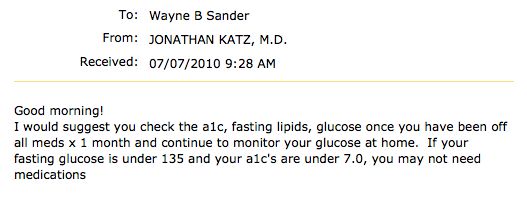 medication and my blood sugar is normal, my cholesterol is normal, my skin looks clear
and my ADHD is totally under control. My side effects cleared up
too. I have to go in to see my doctor in two weeks for a full round
of tests. We haven't looked at my triglycerides yet, but he said
that if this keeps up, I can go off of all of my medications permanently.
I'm blown away.
medication and my blood sugar is normal, my cholesterol is normal, my skin looks clear
and my ADHD is totally under control. My side effects cleared up
too. I have to go in to see my doctor in two weeks for a full round
of tests. We haven't looked at my triglycerides yet, but he said
that if this keeps up, I can go off of all of my medications permanently.
I'm blown away.
My blood sugar was 135 this
morning, it used to get up in the 260-300 range before I started taking
medication. My cholesterol is 153 now, it used to be above 300.
I'm not sure if any of my friends believe what's going on well enough to
sign up, but a couple might. I'm really trying to not use Facebook
for marketing, however some things are just way too good not to share.
Glyconutrients and Cell to Cell Communication
Research over the past decade has demonstrated the importance of essential fatty
acids and essential proteins (amino acids). Now scientists and nutritionists are beginning to
understand the role of glyconutrients which
supports the process our individual tissue cells use to recognize, and
communicate with, each other. The work that Dr. Blobel and many others
have done let us understand the importance of good cell communication to
ensure good health. Disease is a symptom of one or more body systems in
distress. When you nourish and balance the systems, you give your body
what it requires to resist, repair and overcome disease, and to achieve optimal health.
Killer Fats
Good fats are the naturally-occurring, traditional fats that haven't
been damaged by high heat, refining, processing or other man-made tampering
such as 'partial hydrogenation'. Many studies
have demonstrated a very close association between consumption of unsaturated
oils and the incidence of cancer.
Trans Fats: The Hidden Killer in our Food
Dane A. Roubos, D.C - "Another 'side-effect' of hydrogenation
is that a residue of toxic metals, usually nickel and aluminum, is left
behind in the finished product. These metals are used as catalysts in the
reaction, but they accumulate in our cells and nervous system where they
poison enzyme systems and alter cellular functions, endangering health
and causing a wide variety of problems. These toxic metals are difficult
to eliminate without special detoxification techniques, and our 'toxic
load' increases steadily with small exposures over time. Since they are
increasingly found in our air, food and water, the cumulative doses can
add up to dangerous levels over time. Since trans- fats don't occur in
nature, our bodies don't know how to deal with them effectively and they
act as poisons to crucial cellular reactions. The body tries to use them
as it would the cis-form, and they wind up in cell membranes and other
places they shouldn't be."
Leo Galland, M.D. with Dian Dincin Buchman, Ph.D. - "Unfortunately,
many of the popular oils used today are nonessential fats and many are hydrogenated.
Hydrogenation is a manufacturing process which converts unsaturated fats
into saturated fats to prolong shelf life. Read the labels of foods you
buy in the grocery store. Hydrogenated or partially hydrogenated vegetable
oils are found in margarine, shortening, commercial baked goods and processed
foods. Partial hydrogenation physically alters any EFAs (essential fatty
acids) in the oil which creates artificial fatty acids. Dr. Galland states
that "These artificial fatty acids are not only unnatural and unnecessary,
they can have a disastrous effect on your child's body's ability to use EFAs."